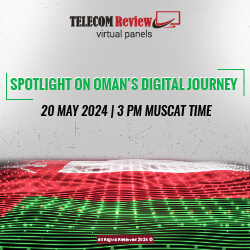Addressing industry experts and stakeholders about the importance of an interconnected economy, Mohammed Al-Tamimi, governor of the Communications and Information Technology Commission (CITC) said that Saudi Arabia will see significant growth in all major areas of digital technology from Internet of Things (IoT) to cloud computing, taking the entire size of the information and communication technology (ICT) sector to $27 billion by 2025.

Reports and Coverage
Abu Dhabi starts development of region’s first-ever quantum computer
To set the stage ready for the operation of the region’s first quantum computer, the Abu Dhabi’s Technology Innovation Institute (TII) unveiled the cryostat - the initial frame of its quantum computer that is being assembled in the UAE capital.
The curious case of facial recognition technology
To open a new bank account, one needs to have two things - money and a face. Puzzled? Don’t be. Welcome to the world of AI-enabled face recognition technology (FRT) that allows an ‘instant and highly secure verification’ process before opening a bank new account. In the UAE, a leading bank collaborated with the Ministry of interior's facial recognition verification system to become the first bank in the country to perform a seamless and efficient verification process using enhanced security measures against fraud and other forms of identity theft. What this means is that UAE citizens and residents can open a new account remotely without the need to visit the bank by using just their faces.
Endless possibilities of Internet of Everything
The network of interconnectivity enabled by the Internet of Things (IoT) technology is gaining momentum as a catalyst for enhancing AI and ML capabilities, data analysis in real-time, industrial solutions, advanced security, edge computing, centralized connectivity, and data management, etc. for efficient operations.
Etisalat transforms healthcare in UAE with digital innovation
Etisalat Digital’s (business unit of Etisalat) unified patient experience value proposition transforms patient care through a combination of innovative technologies.
Fixed wireless access to bring 200 million connections by 2026
Fixed wireless access (FWA) has risen in prominence over the past year. With FWA services surging almost 20% yearly to over 80 million in 2020, a market analysis sees that number of FWA connections would rocket to almost 200 million by 2026.
Qatar: a model for IPv6 adoption
The internet as we know it is transitioning to the latest Internet Protocol Version 6 (IPv6) to fulfill the ever-growing need for internet connectivity. IPv6 promises long-term global and enterprise-level benefits and various businesses and technical service providers have already moved to IPv6-only or dual stack network driven operations.
VoIP advancements with artificial intelligence and machine learning
With the rise of cloud communications, voice calls using the internet have prospered. Voice over Internet Protocol — or VoIP in short — has existed since 1995 and its significance to the way communication evolved through time is often overlooked.
Data in telecom: key asset and key risk
The telecom industry keeps us globally connected via the phone, across the internet, over cables — anytime and anywhere. Mobile operators, satellite companies, internet providers, telephone corporations, and the infrastructure behind these organizations generate and collect a multitude of data on a regular basis.
Brain of tomorrow: Artificial neural networks
With the proliferation of artificial intelligence and deep learning technologies, networks that replicate the functions of the human brain, the smartest and most complex known creation, have been created. You can thank these artificial neural networks (ANNs) for many of applications we use every day, such as Google’s search engine, Apple’s Face ID iPhone lock, and Amazon’s Alexa AI-powered assistant.


















